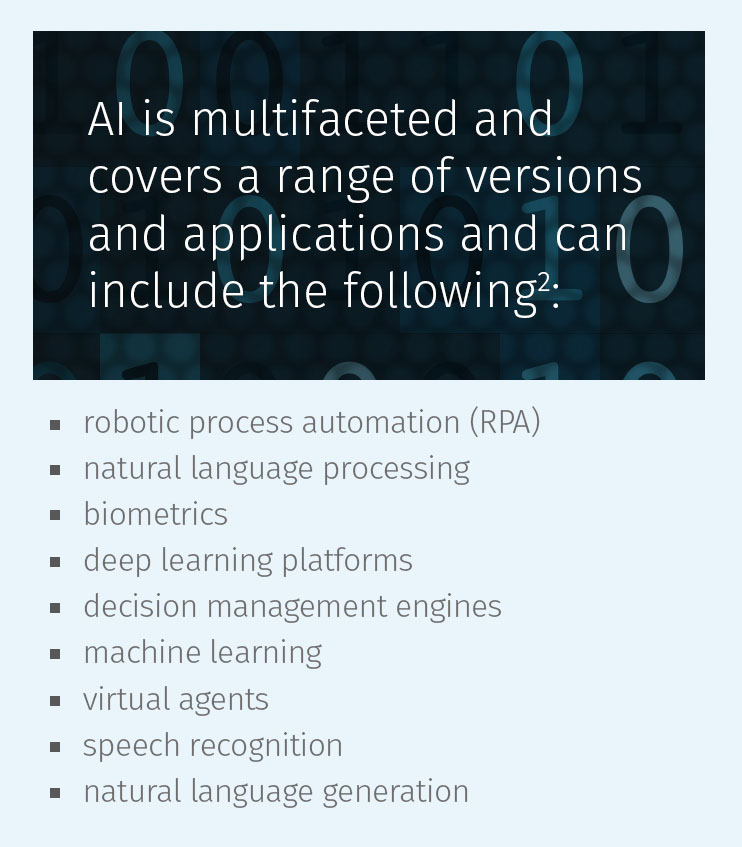Cognitive disruption through advancements in artificial intelligence (AI) is set to transform society, and will influence the way we work, travel, shop, communicate and bank. AI is no longer a futuristic product but an imminent and tangible innovation. In an IBM study of global CEOs, 73 percent of respondents acknowledge that cognitive computing will play a role within their organizations moving forward.1
Key insights
- Conventional equities are overvalued but there is largely untapped potential in the AI sector
- AI can assist private equity with investment decision-making if firms start applying the technology support data analytics
- With clients and regulators demanding more information and greater disclosure, AI could help private equity firms produce detailed and customized reports for both audiences
For private equity, AI is likely to present several opportunities over the next few years, according to panelists at a SuperReturn Private Equity Conference session moderated by Dirk Holz, director, head of origination and business development private capital at RBC Investor & Treasury Services.
The panelists explored three key themes. First, innovations in AI are being developed by a large number of enterprising companies and there is potential for significant return on investment. Second, AI adoption could dramatically rationalize the process by which private equity managers locate deals and make investments. Finally, the application of AI will streamline middle and back offices, helping to facilitate operational alpha.
A busy market for private equity
Having raised an exceptional sum of capital totalling USD 3 trillion over the last five years,3 private equity managers are struggling to find suitably priced investments, according to panelists speaking at Super Return in Berlin. The glut of capital is prompting those firms, which are actually making investments, to acquire companies at more than 10 times or even 13 times EBITDA (Earnings Before Interest, Taxes, Depreciation and Amortization).
Buy-outs at such high multiples are not sustainable over the long term and some private equity managers are responding by looking to make more investments into new or niche technology companies. Despite the potential of AI, very few private equity and venture capital managers have invested in companies developing such technology.
An opportunity in the waiting

Research by McKinsey indicates that between USD 6 billion and USD 9 billion of AI funding came from private equity, compared to the USD 18 billion to USD 26 billion provided by technology giants and other major corporates in 2016.4 Experts suggest that the absence of private equity interests in AI companies may be a missed opportunity that requires further focus.
Panelists at SuperReturn highlighted that while AI was permeating across numerous industries including healthcare, banking and agriculture, it was in the field of autonomous vehicles where rewards were most likely to be realized. One speaker acknowledged the sector could transition into a multi-trillion-dollar business. In a competitive and overvalued private equity marketplace where well-priced deals are challenging to track, AI could be a bright spot.
AI can support private equity processes
Investment managers continue to look for opportunities to differentiate themselves through product innovation and identifying new sources of alpha. Some experts believe a shrewd and systematized application of AI to big data analytics will take private equity investing to a new level.
In a competitive and overvalued private equity marketplace where well-priced deals are challenging to track, AI could be a bright spot
“Information and structured data on liquid companies in public markets is widely available via Reuters or Bloomberg, but it is less prolific in the private market," said Holz. “That, however, is changing, as big data has given private equity managers more and easier access to information on companies that historically may have been below the radar,” he added.
Retaining unstructured data on file alone is not going to redraw the frontiers of private equity investing. To support meaningful change, firms should look to AI software and programs to break down the data into relevant data sets to assist in identifying trends. This insight can then form the foundation supporting company research or potential deal-sourcing and transactions.
Managing the social costs of AI
Disintermediation and disruptive technology are naturally correlated. The CIO of Japan's Government Pension Investment Fund recently commented that AI and other technologies would complement or replace the activities of asset managers.5 Experts at Super Return recognized that tools such as AI, once fully scaled, would play a significant role in the decision-making process but they do not expect investment management to be entirely digitalized.
Modernizing the middle and back office
“Historically, private equity reporting and regulation was straightfoward with firms disclosing little more than an annual net asset value. Since then, regulations such as the Alternative Investment Fund Managers Directive and the Foreign Account Tax Compliance Act have imposed frequent reporting obligations on private equity. In addition, investors are more institutional and expect far more transparent and detailed reporting," said Holz.
Evolving regulatory and investor requirements are driving private equity to expand their middle and back offices, introducing new costs. At the same time, private equity firms have access to significant investor and operational data, which could benefit from AI tools that can assist in mapping and transposing that data into the formats preferred by regulators and clients.
Facilitating the successful implementation of AI and realizing cost efficiencies will require that private equity firms take a prudent approach to ensure that the solutions they choose match the needs and requirements of their organization and end clients.

